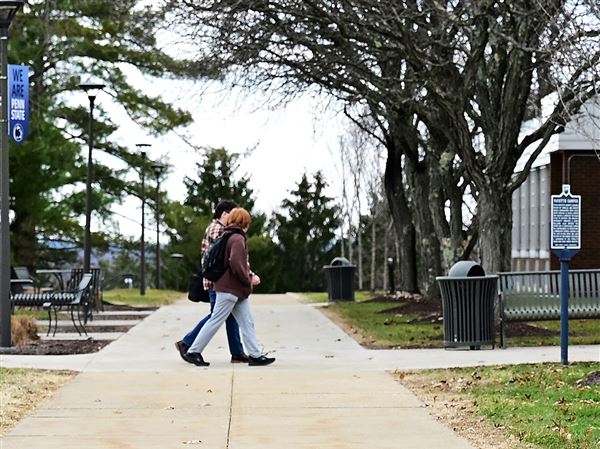HARRISBURG — Autism education at the University of Pittsburgh. Emergency response through the Salvation Army. Programs educating young people about the rivers around Pittsburgh.
These and more Allegheny County programs were flagged to receive funding in legislation accompanying the new state budget, but Gov. Tom Corbett maintains that legislators were optimistic in their projections for state revenue this year, and he has put the designated spending — earmarks, in the administration’s words — on hold.
Mr. Corbett cited the gap in revenue projections earlier this month when he vetoed $65 million in funding for the General Assembly and $7.2 million in other appropriations. He indicated, too, that he would use his authority to hold appropriations in budgetary reserve, meaning the money, at least for now, will not be available for spending.
The administration has decided to divert all but a few of the legislative-designated spending items into budgetary reserves, said Charles Zogby, Mr. Corbett’s budget secretary.
“I still think there’s concern on the administration’s part on the revenues,” Mr. Zogby said. “The freezing of the earmarks was not only to give us a chance to get our arms around them and understand everything there but as a hedge as well against future revenues.”
Keeping the funding items in reserve gives the administration a fiscal cushion. If revenue collections are weak, having declined to release some spending could forestall the need to furlough workers or halt funding for core government functions, Mr. Zogby said.
As presented to Mr. Corbett, the fiscal code, a bill that provides instructions for enacting the budget, contained more than $1.5 million in funding directed specifically to programs in Pittsburgh and Allegheny County.
The legislation draws categories intended to apply to organizations but does not identify them by name. RiverQuest, which offers educational programming from a 90-foot vessel it docks near the Carnegie Science Center, is identified as “a nautical science center in a county of the second class.”
Speaking shortly after the fiscal code passed, Senate Majority Leader Dominic Pileggi, R-Delaware, said the designations direct appropriations to “a narrower class of recipients” than would occur by leaving decisions to the “unfettered discretion” of the administration.
“It is the governor and his office that ultimately makes a disbursement or does not make a disbursement on any of the appropriations,” Mr. Pileggi said.
Senate Republicans have questioned whether the governor is empowered to use the line-item veto on language in the fiscal code and have said they have hired a lawyer to advise them on the matter.
Mr. Corbett vetoed two of the local items, $300,000 in funding for the Intergovernmental Cooperation Authority, Pittsburgh’s state-appointed financial oversight board, and $250,000 for job-search and job-training programs that aides in the Capitol identified as targeted for Travelers Aid of Pittsburgh.
The governor’s office said conversations with the ICA led it to conclude the scheduled boost to $550,000, from $228,000 last year, was not necessary.
Henry Sciortino, the ICA’s executive director, said he has yet to assess the trimming of the agency’s budget request.
“We’re reviewing the matter, and the leadership of the board is working on it,” he said.
The remainder of the funding items could be made available in coming months. One of the items in limbo is $100,000 for training volunteers for disaster relief and purchasing equipment such as refrigeration and mobile feeding units that could be used in large-scale disasters.
“We’re in a bit of a holding pattern right now” with the funds not released, said Sara Swaney, director of corporate and foundation relations for the Salvation Army’s Western Pennsylvania Division. “Our hope is that it will eventually go through.”
The Salvation Army responds to disasters such as fires, floods and tornadoes in a 28-county region of Western Pennsylvania. It initiated a funding request to the Pennsylvania Emergency Management Agency after responding to flooding in Ridgway, Elk County.
“Our emergency disaster services program relies heavily on volunteers that we train,” Ms. Swaney said.
RiverQuest had been slated to receive $150,000 for its programs educating middle-school and high-school students about rivers onboard an 85-ton floating classroom. The organization is on track this year to provide classes to between 9,000 and 10,000 students, said Jim Roddey, president of the board.
“We want them to understand the importance of the rivers to our region from a historic perspective and the importance of economic development generated by the rivers and the importance of a freshwater supply to a major metropolitan area and the benefits that come from recreation provided by the rivers,” he said.
Without the funding, the organization would have to find money elsewhere or reduce the size of the program, he said.
Other money being held in reserve, as identified by Capitol aides, includes $250,000 for violence-prevention programs at the Sarah Heinz House; $200,000 for the promotion of research on cystic fibrosis at the American Respiratory Alliance of Western Pennsylvania, now known as Breathe Pennsylvania; $150,000 for the prevention and treatment of depression in seniors at Western Psychiatric Institute and Clinic; and $240,000 for autism education at Pitt.
Mr. Zogby said the decision to hold the funding is about the administration’s concerns that the state might not collect enough revenue, not the caliber of the programs.
“It’s kind of the nice-to-haves versus the necessities here,” he said. “None of this action should be taken as a negative toward the organization.”
First Published: July 28, 2014, 4:00 a.m.
















